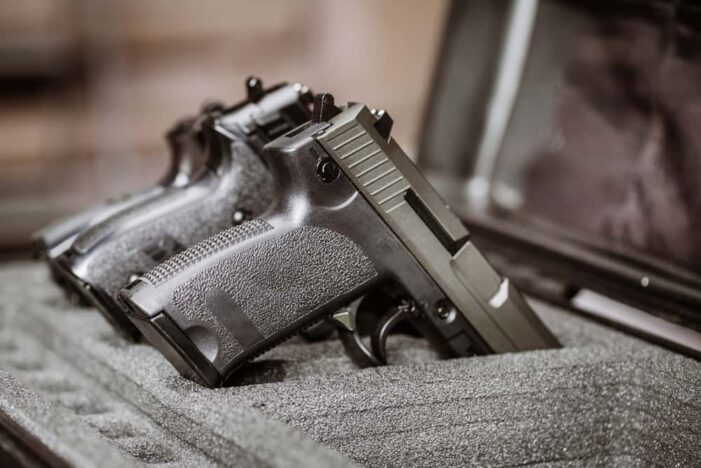By Linda Nwoke
Trinidad and Tobago (T&T), a twin-island nation in the Caribbean, also popularly called the twin-republic and described as the land of the hummingbird, calypso, carnival, and steelpan, is grappling with a severe gun violence crisis that has plagued the country for decades. Stories of gang activity, poverty, and illegal firearms cast a shadow over the island’s beauty. All these often result in an astonishing homicide rate that exceeds the global average.
According to the 2020 Global Study on Homicide, Trinidad and Tobago’s homicide rate is 30 per 100,000 people, ranking among the highest in the world. In 2022 alone, the country recorded over 600 homicides, with the vast majority attributed to gun violence.
Undoubtedly, the impact of gun violence extends far beyond the tragic loss of life, creating a climate of insecurity and hindering economic development. The communities are constantly on edge, living in fear of gang-related violence.
Current Situation: Existing Research and Perspectives
The alarming statistics and the stories on the streets testify to the extent of gun violence in Trinidad and Tobago. According to a report in 2022 by the Trinidad and Tobago Police Service, there were 490 reported homicides in 2022, and over 90% involved firearms. Many of the victims—50%—were between 15 and 29 years old.
The Trinidad and Tobago Police Service also reports that most of the firearm-related incidents are in urban areas, particularly in Port of Spain and San Fernando. Additionally, a concerning trend is the involvement of young adults between the ages of 18 and 25 as both perpetrators and victims.
In a recent incident, a triple homicide shook the community of Arima, leaving three family members dead. This incident is a typical example of the pervasiveness of gun violence and its devastating impact on families and communities.
Another incident is the shooting at Laventille Secondary School in March 2022, resulting in the deaths of two students, thus underscoring the urgency of addressing the issue at its core. These incidents profoundly impact communities, leaving families shattered and causing fear in the hearts of citizens.
Researchers identified several factors contributing to gun violence in Trinidad and Tobago. In a 2016 study published in the journal “Small Arms and Society,” the majority were attributed to socioeconomic disparities, the proliferation of illegal firearms, gang activity, and a lack of effective government intervention.
Sources of Firearms
Trinidad and Tobago’s Crime and Justice Annual Report, by the United Nations Office on Drugs and Crime (UNODC), provides an overview of crime trends in Trinidad and Tobago. They identified the proliferation of illegal firearms as a significant factor driving gun violence in the country, specifically through trafficking, mainly through neighboring countries such as
Venezuela’s lax borders and widespread gun ownership, with traffickers exploiting the weak border control to smuggle weapons across the Gulf of Paria. Secondly, the United States’s role in contributing to the situation through tactics like straw purchasing, theft from gun dealers, and smuggling via maritime routes is to turn legally acquired firearms into tools of destruction. Other regional traffickers, such as Suriname, Guyana, and French Guiana, accommodate regional traffickers who play a substantial role in supplying illegal firearms to Trinidad and Tobago.
Most traffickers employ various routes, such as sea smuggling, porous borders, and, less commonly, air smuggling. Anna Ramdass, a Trinidadian journalist, in 2019, wrote an article for the magazine “Americas Quarterly,” highlighting the role of the porous maritime border and the illicit firearms trade in fueling gun violence. In her write-up, she noted that the country’s proximity to Venezuela, where there is widespread gun ownership and weak gun control, has made it a prime target for traffickers.
In another instance, Dr. Maria Rodriguez, a prominent researcher at the University of the West Indies, studied the causes of gun violence in the country. In her published paper, “Firearms and Violence in Trinidad and Tobago: A Comprehensive Analysis,” Dr. Rodriguez noted the interrelated relationship between socioeconomic factors, gang activities, and illegal firearms.
According to Rodriguez, “addressing the root causes of gun violence necessitates a holistic approach that combines poverty alleviation, educational opportunities, and targeted interventions in high-risk communities.”
Government Interventions and Criticisms
Over the years, the Trinidad and Tobago government has implemented several initiatives to curb gun violence. They implemented a combination of initiatives, including the National Crime Prevention Program, launched in 2021. The initiative focused on community engagement, providing resources for education and job training to at-risk youth. John Williams, the Minister of National Security, emphasized the importance of the program by stating, “We recognize that tackling gun violence requires a comprehensive strategy that involves the entire community.”
Other instances of the government’s intervention in addressing gun violence include legislation, specifically the Firearms Act of 1995, amended in 2000, that regulates the importation, possession, and use of firearms. The launching of intervention through the activities of the police force For instance, the Trinidad and Tobago Police Service implemented anti-gang initiatives and increased patrols in high-crime areas. Furthermore, the government partnered with non-profit organizations to provide community-based education and initiatives.
Criticism from Experts
Despite these efforts, critics argue that the government’s approach has been insufficient and lacks a comprehensive strategy. They highlight that not all responses have been positive, as there is a continued increase in illegal firearms, a lack of effective border control, and inadequate support for social programs.
One of the main criticisms of the government’s approach is the need for a comprehensive and coordinated strategy. Journalist Ramdass criticized the government’s fragmented approach to gun violence, arguing that a more comprehensive strategy is needed to address the root causes of the problem. She claims that the government’s efforts have been reactive and have failed to address the root causes of gun violence. She calls for a multifaceted approach encompassing law enforcement, social development, and community engagement.
Critics of government legislation argue that the law could be more effective due to loopholes and inconsistencies. They point to the ease with which individuals can obtain gun licenses and the lack of stringent background checks and record-keeping provisions.
Furthermore, the Trinidad and Tobago Police Service (TTPS) received criticism for its response to gun violence. Roger Goddard, a criminologist and researcher at the Institute of Criminology, University of the West Indies, states that the government’s reliance on law enforcement as the primary solution to gun violence is faulty. Additionally, he argued that the TTPS has failed to investigate gun-related crimes adequately and lacks the resources and expertise to combat gun violence effectively.
David Abdulah, a sociologist and expert on Caribbean security issues, argues that the government’s failure to address the issue of border control adequately has facilitated the flow of illegal firearms into the country. Trinidad and Tobago’s porous maritime borders are a significant entry point for illegal firearms. Critics argue that the government has failed to adequately address this issue, resulting in the continued flow of illicit weapons into the country.
Community-based organizations and activists have also called for greater involvement in the government’s efforts to address gun violence. They believe that community engagement is crucial for developing effective and sustainable solutions and that the government has not adequately tapped into the potential of community-based organizations to address the issue.
The Trinidadian Think Tank, the Institute of Social and Economic Research (ISER), mainly researched gun violence and its impact on society. ISER criticized the government’s lack of community engagement in its efforts to address gun violence, arguing that community-based organizations can play a vital role in developing effective solutions.
The Human Rights Advocacy Group’s statement critiques the need for more transparency in the government’s approach and calls for greater collaboration with civil society organizations.
A Unified Call to Action
Gun violence remains a deeply entrenched problem in Trinidad and Tobago, demanding a multi-pronged approach and a united front to address the root causes. Experts have encouraged various strategies, including strengthening border controls and providing effective social support programs. They also indicated that the government collaborates with communities, civil society, and regional partners to tackle this multifaceted issue. All these will restore all citizens’ sense of safety and security.
On the other hand, citizens, policymakers, and researchers must also recognize the need for collective responsibility toward ongoing dialogue and work toward a future where gun violence is a thing of the past in the country.
The glaring impact of these shadowy networks emphasizes the need for a collective effort that includes a combined effort to combat the illicit gun trade through strengthening border security, enhancing law enforcement cooperation, and addressing the root causes of gun violence, which can bring about the desired change. Together, all hands can strive for a future where safety prevails over the shadows that linger.



